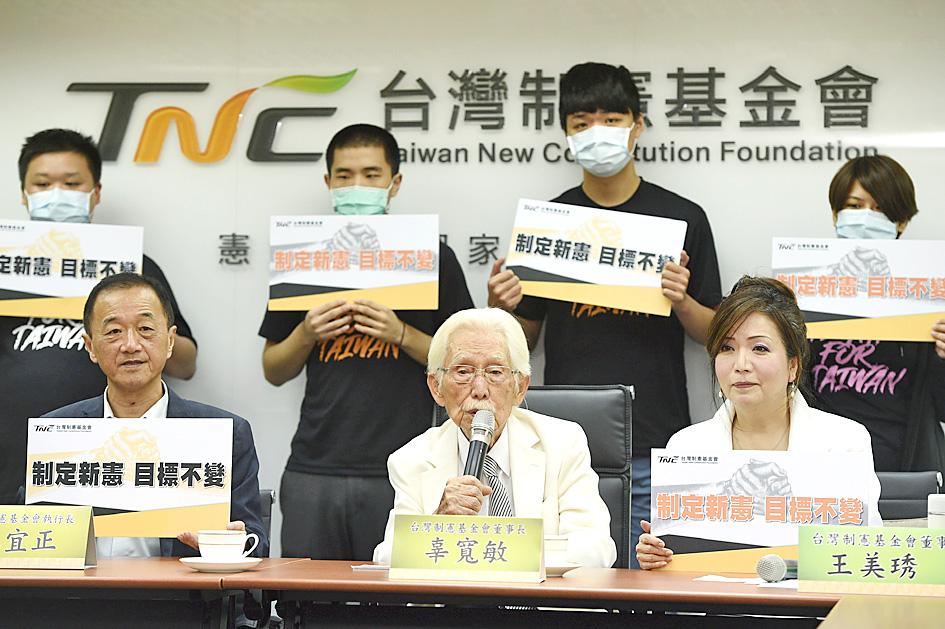The Taiwan New Constitution Foundation yesterday said it would call for constitutional interpretations and is considering submitting other referendum proposals, following the rejection on Friday of its two referendum proposals on constitutional reform.
The Central Election Commission rejected the proposals without clarifying its reasoning, foundation chairman Koo Kwang-ming (辜寬敏) told a news conference in Taipei.
“The greatest obstacle to the nation’s normalization and development is the Republic of China [ROC] Constitution,” he said, adding that democracies use referendums, not revolutions, to solve problems.

Photo: George Tsorng, Taipei Times
The 95-year-old said he has spent a half-century fighting for Taiwan, with the biggest changes coming over the past few decades in the wake of democratization.
Although the nation’s civic consciousness and international standing have improved, they are still lacking, he said.
Considering how “miserable” Taiwan was under former president Chiang Kai-shek (蔣介石), “how could the Republic of China brought by Chiang be our country?” Koo asked, adding that the nation therefore needs to draft a new constitution, so that its future can be determined by its 23 million citizens.
However, Taiwan’s biggest issue is that it is “not a normal nation,” Koo said, adding that even President Tsai Ing-wen (蔡英文) of the Democratic Progressive Party (DPP) sings the line “foundation of our party” in the national anthem and still uses the name “Republic of China.”
“Can she not use the ‘Republic of Taiwan’?” he asked, saying that Tsai is still not willing to drop the ROC name, despite polls showing that more than 90 percent of Taiwanese support the nation’s normalization.
Taiwanese support self-determination, but even with the DPP in power, the nation is still governed by a constitution that was not drafted by the nation’s people, meaning that Taiwanese are not governing themselves, Koo said.
As his time is limited, Koo said he is determined for his last contribution to be constitutional reform, and vowed to fight for the nation’s normalization, despite the difficulty of the task.
“I will not leave the DPP, nor will I resign as a presidential adviser, but I will continue pushing for a new constitution,” he said.
Koo and his contemporaries have fought for decades to establish a normalized nation on Taiwan, yet they have come up against a wall: the DPP government, foundation director Michelle Wang (王美琇) said.
The Constitution entangles Taiwan with China and traps the nation in an abnormal situation, making it impossible to even change its name to “Taiwan,” Wang said.
It is understandable that some people are fond of the ROC name, but with the global situation changing in the wake of the COVID-19 pandemic, Taiwanese do not want their nation to be confused with China, she said.
The Constitution prevents Taiwan from having a proper place in the international community, let alone call itself Taiwan, Wang added.
Aside from calling for a constitutional interpretation, the foundation is also considering forming an alliance with other organizations to continue pushing for constitutional reform, she added.

An essay competition jointly organized by a local writing society and a publisher affiliated with the Chinese Communist Party (CCP) might have contravened the Act Governing Relations Between the People of the Taiwan Area and the Mainland Area (臺灣地區與大陸地區人民關係條例), the Mainland Affairs Council (MAC) said on Thursday. “In this case, the partner organization is clearly an agency under the CCP’s Fujian Provincial Committee,” MAC Deputy Minister and spokesperson Liang Wen-chieh (梁文傑) said at a news briefing in Taipei. “It also involves bringing Taiwanese students to China with all-expenses-paid arrangements to attend award ceremonies and camps,” Liang said. Those two “characteristics” are typically sufficient

A magnitude 5.9 earthquake that struck about 33km off the coast of Hualien City was the "main shock" in a series of quakes in the area, with aftershocks expected over the next three days, the Central Weather Administration (CWA) said yesterday. Prior to the magnitude 5.9 quake shaking most of Taiwan at 6:53pm yesterday, six other earthquakes stronger than a magnitude of 4, starting with a magnitude 5.5 quake at 6:09pm, occurred in the area. CWA Seismological Center Director Wu Chien-fu (吳健富) confirmed that the quakes were all part of the same series and that the magnitude 5.5 temblor was

The brilliant blue waters, thick foliage and bucolic atmosphere on this seemingly idyllic archipelago deep in the Pacific Ocean belie the key role it now plays in a titanic geopolitical struggle. Palau is again on the front line as China, and the US and its allies prepare their forces in an intensifying contest for control over the Asia-Pacific region. The democratic nation of just 17,000 people hosts US-controlled airstrips and soon-to-be-completed radar installations that the US military describes as “critical” to monitoring vast swathes of water and airspace. It is also a key piece of the second island chain, a string of

The Central Weather Administration has issued a heat alert for southeastern Taiwan, warning of temperatures as high as 36°C today, while alerting some coastal areas of strong winds later in the day. Kaohsiung’s Neimen District (內門) and Pingtung County’s Neipu Township (內埔) are under an orange heat alert, which warns of temperatures as high as 36°C for three consecutive days, the CWA said, citing southwest winds. The heat would also extend to Tainan’s Nansi (楠西) and Yujing (玉井) districts, as well as Pingtung’s Gaoshu (高樹), Yanpu (鹽埔) and Majia (瑪家) townships, it said, forecasting highs of up to 36°C in those areas